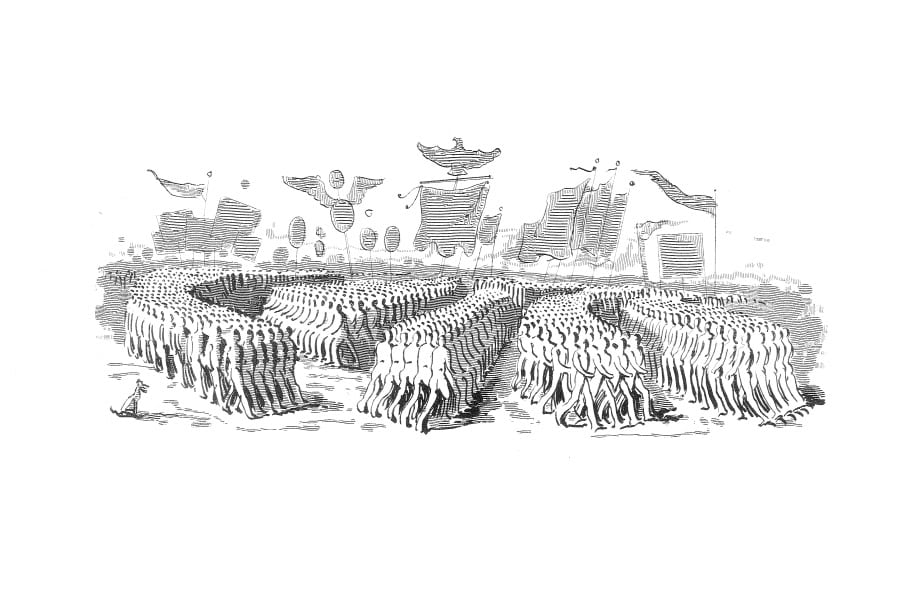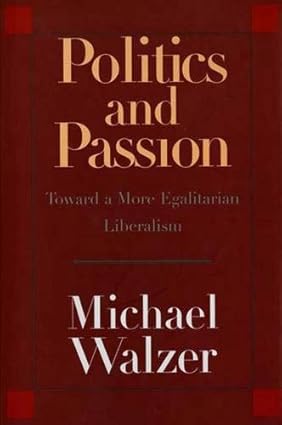Books Reviewed
Michael Walzer’s new book, Politics and Passion, belongs to a vigorous debate among liberal political theorists that has bypassed most conservatives. Even when we discuss similar issues, our orientation, references, and concerns differ. Indeed, the book reminds us, usefully, how a large segment of the liberal-left now talks.
Walzer’s thoughts come from someone whose independence and intelligence make him a force in his own right, however; so his arguments are not merely emblematic but individual. They eschew concocted illustrations and technical analysis to concentrate instead on major themes and what he believes are factual examples. Unlike thousands of younger liberal-left theorists, moreover, he does not feel obliged to trace his every thought, faithful or transgressive, to father John Rawls, as if he were a maiden honoring the potent Maypole in convoluted dance.
Walzer’s book stems from his well-known (in his circles) 1990 paper, “The Communitarian Critique of Liberalism.” The book has three main purposes. One is to reassert the importance of groups and group identity, especially of what Walzer calls “involuntary associations” in liberal democracies. We are not born as isolated individuals, but with belongings and attachments. A second is to use this idea to press for the greater equality for which, as a democratic socialist, he always has argued, because inequality attaches not only to isolated individuals, but also to the associations that help to define them. A third is to criticize the excesses of the liberal “deliberative democracy” movement that he correctly identifies as the American domestication of Habermas’s abstraction. If we take these elements together, especially the first and third, we find ourselves defending some of what is irrational or passionate about politics, as opposed to cold, individual calculation and deliberation. Hence, Politics and Passion.
Involuntary associations are groups into which we are born, such as ethnic or religious groups, not ones we choose. Because we all are born into such groups, the notion that in liberal societies every association is joined voluntarily is for Walzer a myth or, at least, an overstatement. Being born into such groups affects one’s equality because some groups face a tougher time than others: “No Irish need apply.” It is, therefore, not enough to equalize people’s chances as individuals, because they never are seen as themselves alone but also as blacks, Jews, women, and so on. More than this, the liberal picture is problematic or, indeed, unfair for groups that need total or at least significant control to reproduce their way of life, groups that cannot allow their members to act or conceive of themselves as independent individuals. Walzer proposes to give groups greater, but not illiberally stultifying, strength by having government channel cradle-to-grave life cycle services through them, providing more to the poorer groups. He hopes or presumes that this “meat and potatoes multiculturalism” will make us more equal.
Walzer’s argument rests on what he thinks of as sociology, that is, general views of how groups work and of liberalism’s effect on them. He does not, however, actually examine, say, today’s Mormons or Amish, the path taken by immigrant Jews or Italians, or the current developments among different Hispanic, Asian, or South Asian populations in the United States or elsewhere. Moreover, when he mentions the groups that he thinks are poor and stigmatized in today’s America—blacks and Native Americans—he does not even begin to try to account for the wide disparities in achievement among blacks, the actual record of ethnic-neighborhood empowerment in Johnson’s Great Society, the effects on Native American poverty of casino wealth, differences among tribes, or a host of other concrete matters. The absence of facts makes for unconvincing sociology.
Walzer’s argument also rests on a rather extreme view of liberalism. As he interprets (or somewhat caricatures even) Rawls’s version, liberals believe or hope that each of us someday will be a completely independent individual, the absolute arbiter of his own life-plan, creator of his own self, all of whose associations are voluntary. The Supreme Court’s infamous opinion in Planned Parenthood v. Casey (1992) expresses a version of this view, as it has migrated from rococo feminist fantasy to vulgar law school cartoon: “At the heart of liberty is the right to define one’s own concept of existence, of meaning, of the universe, and of the mystery of human life.”
To this radical-feminist, academic-poetic, or vaguely democratic-Nietzschean dream, Walzer opposes the reality of his involuntary groups. The effect is similar to what occurred when liberals opposed an idealized bureaucracy, which they pretended was real, to actual markets in their ugliest forms, in order to show how much better government is than markets. It also is similar to the way that some conservatives oppose an idealized free market, which they pretend is real, to actual government in its greatest stupidities, in order to show how worthless anything is but markets and the motive of wealth. Walzer takes a liberalism more bereft of attachment than anything Locke and the American Founders defended, Tocqueville described, or that one actually sees today and opposes to it an overly airbrushed version of group definition and control. This exposes some of his opponents’ blind spots and promotes some of his own strengths, but the overall result is misleading.
In a sense then, much of Walzer’s book is a solution—greater equality through government-subsidized meat and potatoes multiculturalism—in search of a problem. He does not show why our current regime of individual choice does not produce appropriate loyalty to appropriate groups; dig down to the specific levels where group stigma actually may remain damaging; or make a case why we should be unhappy that life in the tolerant United States is difficult for totalizing communities. Oddly, he therefore never describes just what about inequality, and how much of it, is harmful and, thus, why his solutions are best. Perhaps some combination of school choice and decreased regulation, from the Right, and higher taxes for the very rich, from the Left, would do the trick.
* * *
If one does not agree that Walzer makes involuntary groups seem more desirable than they are, one should at least agree that his discussion of them is vague, not just factually but conceptually. What are they exactly, and who speaks for them? Sometimes he has in mind groups as broad as race and gender. Other times he has in mind groups as narrow as the American Amish. Occasionally he has in mind religion in general, orthodox groups in Israel, or a faith such as Catholicism.
This conceptual vagueness often makes it difficult to know what to make of his argument. As Walzer recognizes, some of these groups control their members’ lives more than others, and their leaders want to keep it so. Why, however, should an Amish child be a pawn of his elders’ wishes, or sacrificed to the small-group, small-town sentimentalities of cosmopolitan academics? If the child’s group, with all its power, and with a government such as ours that is not bent on destroying or even very much controlling it, is insufficient to hold his complete loyalty, why should we be responsible for helping the group’s leaders or spokesmen maintain their dominance? Walzer would, for the sake of furthering some liberal practices (equal education of men and women, for example) not allow state subsidies to groups that violated these practices. Why should we subsidize them in the first place, or allow them to deviate from effecting equal rights? In his wish to recognize the reality of associations, Walzer sometimes is too forgiving of illiberalism.
If we focus on large groups such as race, gender, and faith broadly defined, the analysis is odd in a different way. It is, as we said, unclear why any of our sympathies should rest with, say, those particular Muslims (for what else could Walzer mean when he says that “the group” wants this or that?) who want more and more control rather than with those who long for liberation. Unclear also is why we should allow the self-proclaimed spokesperson for blacks or women to tell us what the group wants and then encourage members to receive services, or even define themselves, primarily in that way. In these cases, we lack the excuse of the more organic totality of small, particular, churches and neighborhoods. We lack as well any good argument why someone should (or does) think of herself primarily as a woman and not a Catholic, lawyer, Irish American, and so on. Walzer himself notes this, but this does not make his argument more precise. For if we are compounded from many groups, is not the individual who associates voluntarily the primary fact, even when she chooses to dwell within the ties into which she is born?
Although we belong from the start to certain associations (and have certain talents), some of them are easier to shrug off than others. It is easy enough to stop going to church, to move out of town, to choose a better or worse job than one’s parents did, and, except if one is an academic, to vote for a Republican or marry one. These free steps may require gumption and luck but not prodigies of spirit or talent. It is, by contrast, not yet possible to become Heifetz or Einstein at will, although not so hard to become better educated. Race and gender are impossible (now) to change completely, but a single race is in any event an increasingly difficult category to apply to any individual, and even gender already can be changed, externally. Should we, then, determine ourselves more by what we cannot change—talents and their best use, as well as original associations—or by what we can? Walzer would like us to be loyal to the groups that (helped) make us what we are, whether we chose them or not. There is something to this fidelity, of course, but he does not succeed in showing when and where our involuntary ties should guide us more than our voluntary ones. A significant discussion of natural limits, not merely historical ones, is struggling to take flight within an argument that, however intelligent, is overly determined by his political commitments and intellectual audience.
The meat and potatoes part of Walzer’s desire to enhance groups’ standing also is vague. He may have in mind targeted welfare (faith-based initiatives directed only at those of one’s own faith?), but welfare should be self-overcoming, not perpetual. He surely cannot mean laws that require that one earn one’s living in a particular place or be married or buried only by one’s original church. The harmful illiberalism of such suggestions vastly outweighs their putative value in dealing with a vaguely stated problem. He may have in mind vouchers or other mechanisms that advance private schooling: he puzzles about what the state’s citizenship requirements allow it to demand of schools’ curricula. But he does not support state funding of private schools in so many words. In any event, a voucher one can use only for schools appropriate to what the law determines is your child’s faith, race, or other group-identity also would be breathtakingly illiberal. The less restrictive “conservative” measures of individually controlled school vouchers, faith-based welfare, and greater federalism within an open economy strike a better balance between advancing liberal freedom and protecting mediating institutions.
* * *
One sees in Walzer’s book an attempt to complicate the liberal notion of what is right and good by introducing certain elements of “one’s own.” This is healthy within limits, for he recognizes and seeks to preserve the importance of religious, traditional, and other involuntary attachments. The major difficulty with his discussion, however, is that he does not examine or elaborate the argument for natural rights, or examine with care what makes our individual choices, or the choices of groups to which we belong, worthwhile. Rather than defending natural rights, he makes the state’s liberalizing and enlightening interests rest on citizenship. He then uses citizenship requirements to oppose cultural ties he finds offensive. But democratic citizenship is too thin a reed on which to rest our freedoms. The sheer fact of equal voting in a state does not by itself require very much liberalism or enlightenment, especially if more and more choices are made through groups that may not be very democratic. Walzer’s approach loses or at least covers up the purpose of democratic citizenship, namely, the expansion and protection of equal rights. My justification for alleviating your moral and intellectual degradation is not limited to the fact that we will be voting together.
Liberal rights and liberal regimes are not merely things that we happen to prefer, to which illiberal groups that operate in their midst must accommodate themselves, and we to them. There are reasons that we choose liberalism and that justify our (we hope responsibly executed) wish to liberalize the illiberal. These reasons are inseparable from individuals who stand apart from every group, not “sociologically” but in their rational freedom and pride. Liberalism attempts to elevate our attachment to our own free self into a rational understanding of the rights that constitute this self, and the character and competition that best develop and satisfy it. However much the individual belongs to associations, he is freely in tension with them, potentially more cosmopolitan and normally more self-interested. The ethnic, religious, and neighborhood groups that help convey our self-interest and develop our intellectual and moral independence are healthiest when they abet, but do not seek to replace, the natural, individual ground of self-interested satisfaction, or the rational ground of cosmopolitan openness.
These points may seem too theoretical, even if one largely agrees with them. They do make a practical difference, however. Liberal democracy will not sustain itself if it does not believe itself to be rationally defensible; attempts to “thicken” it that occlude the clarity of its principles—that depart too far from individual rights—are unnecessarily risky. They incorrectly make it look too arbitrary or too low. Because Walzer concentrates on groups and citizenship, moreover, he pays too little attention to the content of liberal character. (His few remarks do not constitute an argument.) The tolerant, industrious, decent, and responsible individual is a worthy goal, however—not just a liberal necessity. The fact that his attachments are voluntary in principle will square well enough with the loyalty and good sense to which his character will dispose him in practice. This is not to say, however, that the truth of natural rights is sufficient on its own to distinguish in each case genuine happiness from false contentment.




